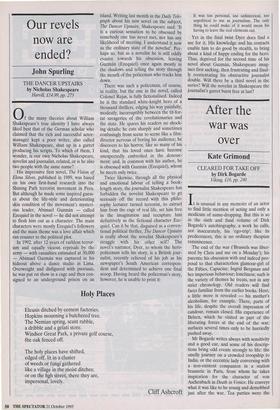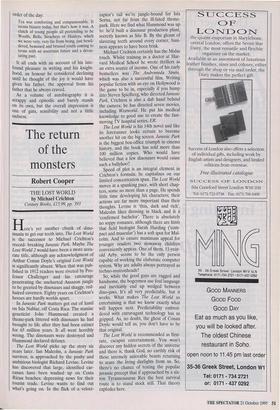After the war was over
Kate Grimond
CLEARED FOR TAKE OFF by Dirk Bogarde Viking £16, pp. 240 It is unusual in any memoirs of an actor to find little mention of acting and only a modicum of name-dropping. But this is so in the sixth and final volume of Dirk Bogarde's autobiography, a work he calls, not inaccurately, his 'ego-trip'; like its predecessors, this is no ordinary thespian reminiscence.
The end of the war (Brussels was liber- ated by Chris and me on a Monday'); his parents; his obsession with and indeed pro- posal to that characterless glamour-girl of the Fifties, Capucine; Ingrid Bergman and her imperious behaviour; loneliness; such is the variety of themes he treats, not in any strict chronology. Old readers will find faces familiar from the earlier books. Here, a little more is revealed — his mother's alcoholism, for example. There, parts of his life, despite the overall impression of candour, remain closed. His experience of Belsen, which he visited as part of the liberating forces at the end of the war, surfaces several times only to be hurriedly pushed away.
Mr Bogarde writes always with sensitivity and a good ear, and some of his descrip- tions bring odd events strongly to life: the smelly journey on a crowded troopship to India, or the eccentric lady conversing with a non-existent companion in a station brasserie in Paris, from whom he takes inspiration for the character of von Aschenbach in Death in Venice. He conveys what it was like to be young and demobbed just after the war. Tea parties were the order of the day:
Tea was comforting and companionable. It seems bizarre today, but that's how it was. A clutch of young people all pretending to be Woolfs, Bells, Stracheys or Huxleys, which we were very, very far from being, just bewil- dered, bemused and bruised youth coming to terms with an uncertain future and a devas- tating past.
It all ends with an account of his late- found pleasure in writing and his knight- hood, an honour he considered declining until he thought of the joy it would have given his father, the approval from his father that he always craved.
As a volume of autobiography it is scrappy and episodic and barely stands on its own, but the overall impression is one of guts, sensibility and not a little sadness.











































































 Previous page
Previous page